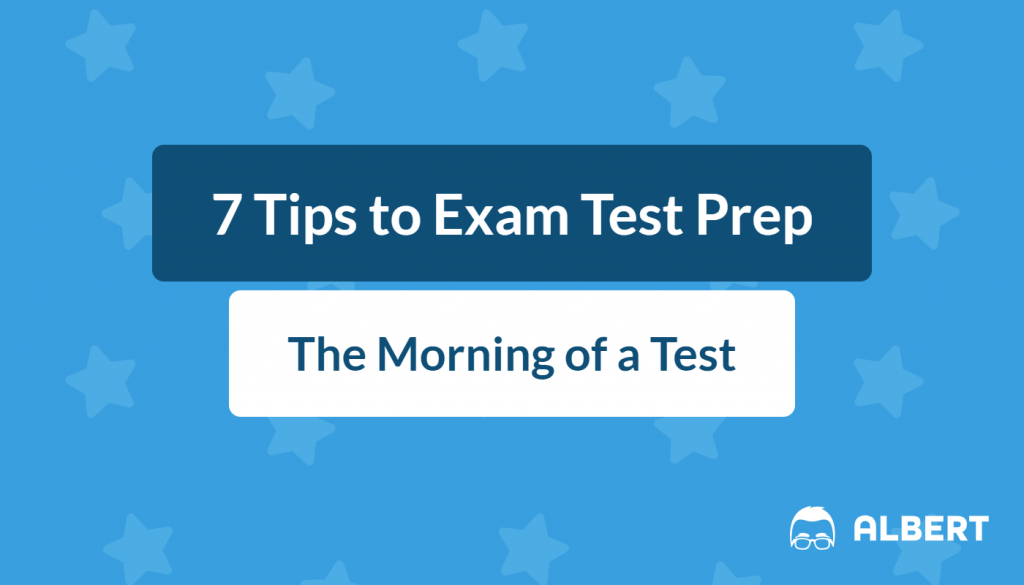How do you get ready for your tests
How do you get ready for your tests
How do you get ready for your tests
Task 3. You are going to give a talk about school exams. You will have to start in 1.5 minutes and speak for not more than 2 minutes (10-12 sentences). Remember to say:
— what exams you have to take this year;
— whether exams are useful for your learning or not, and why;
— how you get ready for your most difficult exams;
— what your attitude to school exams is.
You have to talk continuously.
Now I’m going to talk about exams.
To begin with, I’d like to say that nowadays more and more students understand the importance of school exams.
This year I’m taking 4 State General Exams: in Russian, English, Maths and Social Studies.
I enjoy taking exams because they’re a great mental challenge. Exams motivate me to study harder and take responsibility for all the results, but for some of my friends and classmates, all the exams are very stressful and difficult. Exams can be challenging, unfortunately, not all the students can realize that they should work hard to show the best results.
For example, to get ready for my difficult English exam I do a lot of tests and dictations with my teacher, discuss different topics, watch English films and educational videos on the Internet.
I believe that all my school exams prepare me for my adulthood and teach me responsibility and determination.
I hope the level of my knowledge will be good enough and I will achieve the best results.
| Критерии оценивания ответа на задание С4 | Баллы |
|---|---|
| Решение коммуникативной задачи (К1) | |
| Задание выполнено полностью: цель общения достигнута, тема раскрыта в полном объёме (полно, точно и развёрнуто раскрыты все четыре аспекта, указанных в задании). Объём высказывания: 10–12 фраз | 3 |
| Задание выполнено: цель общения достигнута, НО тема раскрыта не в полном объёме (один аспект раскрыт не полностью). Объём высказывания: 8–9 фраз | 2 |
| Задание выполнено частично: цель общения достигнута частично, тема раскрыта в ограниченном объёме (один-два аспекта не раскрыты, два аспекта раскрыты не в полном объёме, остальные аспекты раскрыты полно и точно). Объём высказывания: 6–7 фраз | 1 |
| Задание не выполнено: цель общения не достигнута: три аспекта содержания не раскрыты*. Объём высказывания: 5 и менее фраз | 0 |
| Организация высказывания (К2) | |
| Высказывание логично и имеет завершённый характер; имеются вступительная и заключительная фразы, соответствующие теме. Средства логической связи используются правильно | 2 |
| Высказывание в основном логично и имеет достаточно завершённый характер, НО отсутствует вступительная заключительная фраза, имеется одно-два нарушения в использовании средств логической связи | 1 |
| Высказывание нелогично И/ИЛИ не имеет завершённого характера, вступительная и заключительная фразы отсутствуют; средства логической связи практически не используются, или допущены многочисленные ошибки в их использовании | 0 |
| Языковое оформление высказывания (К3) | |
| Использованный словарный запас, грамматические структуры, фонетическое оформление высказывания соответствуют поставленной задаче (допускается не более четырёх негрубых лексико-грамматических ошибок И/ИЛИ не более трёх негрубых фонетических ошибок) | 2 |
| Использованный словарный запас, грамматические структуры, фонетическое оформление высказывания соответствуют поставленной задаче (допускается не более пяти негрубых лексико- грамматических ошибок И/ИЛИ не более четырёх негрубых фонетических ошибок) | 1 |
| Понимание высказывания затруднено из-за многочисленных лексико- грамматических и фонетических ошибок (шесть и более лексико- грамматических ошибок И/ИЛИ пять и более фонетических ошибок) ИЛИ более трёх грубых ошибок | 0 |
| Максимальное количество баллов | 7 |
*Примечание. При получении экзаменуемым 0 баллов по критерию «Решение коммуникативной задачи» всё задание оценивается в 0 баллов.
Other
How to Use these 7 Tips for Exam Test Prep the Morning of the Test
You wake up on the morning of your exam, and you’ve already done all you can to study. But, how do you get your mind and body ready for test day? We provide in this article 7 exam test prep tips for the morning of an exam.
Just as an athlete has to prepare properly for an important game, it’s up to you as a student to prepare yourself on the morning of a test. But, unlike an athlete, you don’t have a coach to guide you. It’s difficult to know what you need to do to prepare on test day. That’s why we’re here to help!
Read on for the 7 exam test prep tips to follow so you can do your best on test day. Let’s get started!
Tip 1: Prepare Things The Night Before.
No one wants to be running around like a crazy person looking for their pencil when they’re trying to get out the door. Preparing certain things the night before an exam can help to de-stress and slow down your morning. Organize these things the night before your exam, so you can go to sleep easy and wake up with peace of mind.
1. Collect your materials.
First and foremost, prep your materials the night before. Sharpen your wooden #2 pencils and have them ready to go with your calculator and spare batteries. That way you know that you have them, you know where they are, and you know that they’re ready.
2. Get enough sleep.
Your mind might be racing the night before a test, but do yourself a favor and get in bed early. Relax your mind with a book or a cup of tea, and put down the cell phone. Aim for a solid 8 hours of shut-eye.
3. Set your alarms.
Keep in mind that if you generally run late in the morning, set your alarms for a few minutes earlier. This will allow yourself that extra buffer of time so that you’re not feeling rushed. Nothing is more stressful to the proctor, the other testers, and yourself than arriving late.
4. Lay out your outfit.
Have your clothing sitting out and ready to go. We talk later in the article about how to choose your clothes, and it’s important to have them ready so you don’t spend 10 minutes you don’t have looking for your lucky socks.
5. Map out your route the night before.
If you’ve never been to the testing location before, look it up online and select your route. You don’t want to be trying to figure out where to go on the morning of the test. Be sure to allow time for traffic. Unexpected delays can pop up on any day, plan out your time so that you can arrive at the testing location with 20 minutes to spare.
Tip 2: Wake Up Your Mind And Body.
It’s very important that in the morning you’re focusing on waking up both your mind and body so that you’re wholeheartedly ready to take on a long test. Prepare to pass your exam with flying colors by using the tips below on what to do the morning of an exam.
1. Listen to music.
Listen as you get ready or in the car on your way. If you have a playlist of your favorite songs, chances are the music will get your body energized and you’ll either sing along with the songs in your head or out loud. This allows your brain to start processing and remembering information.
2. Repeat positive affirmations.
You’ve been prepping hard for this test, and you’re ready! Avoid all negative talk (i.e. “I can’t do this). Remind yourself you’re ready and that you’re going to try your best.
3. Calm yourself with focused breathing.
If you’re feeling on edge, pause and take some time to just focus on taking deep, even breaths. This is known to reduce anxiety and calm your nerves.
Tip 3: Wear Appropriate Attire.
When getting dressed, think of the exam room and environment over the weather. Even if it’s 90 degrees outside, think of what the test environment will be like. Chances are, it’ll be air-conditioned and you’ll be sitting there for hours so make sure you dress prepared to stay at a comfortable temperature.
1. Dress in layers.
If it’s warm outside, be sure to bring a sweater or light jacket in case the room is chilly. The same goes for the opposite; if the weather is cold outside, make sure to layer your clothing so that you can remove layers during the test if you begin to feel hot.
2. Choose comfortable clothing.
Keeping your body comfortable helps to minimize distractions and external effects on your abilities while taking the test. You don’t want those jeans that are a little too tight, or that shirt with the itchy tag.
3. Wear what makes you feel good.
Wear something that makes you feel confident, and ready to do your best. Even though your old pajamas might be the most comfy thing in your closet, they won’t put you in the right frame of mind for test day. Put something on that makes you feel capable and confident.
Tip 4: Eat A Smart Breakfast.
Even if you’re not a breakfast person, eating breakfast is essential before a long test. After all, this isn’t just another day at school. Your breakfast should include necessary vitamins as well as keep you energized and full. We list some options below of what to eat before a test, but pick what you enjoy most!
1. Make your meal well-rounded.
Hunger is just another distraction that you don’t need, so make sure your breakfast is healthy and filling. Bagels are a great way to keep yourself full, and spreading peanut butter on them instead of butter or cream cheese makes them a lighter choice with more energizing nutrients.
Pairing that with a Greek yogurt and/or a glass of chocolate milk ensures that you’re getting a well-rounded breakfast that will keep you fuller longer.
2. Bulk up your cereal.
While cereal can be a great source of calcium and fiber (depending on what cereal you eat), you probably won’t be kept full for very long. Make your cereal heartier by putting in some extra fruit, like sliced strawberries or a banana. Toss in some crunch, like nuts or seeds, for added protein and healthy fats.
3. Avoid unhealthy foods.
Stay away from foods with high sodium and fat contents because those can make you get that “fat and sleepy” feeling. Also avoid greasy and sugary foods to help prevent an upset stomach. It’s the same concept as an athlete eating safe foods before an event; you want your body to be in its best state.
Tip 5: Warm Up Your Brain.
While you’re eating breakfast and getting ready during the morning, try to read something small and short. Reading lightly before an exam is the same effect as stretching before working out. You’re about to exercise your brain so it needs to be warmed up to perform its best as well. Use these tips on what to do the morning of an exam to get your mind moving.
1. Skim some high-interest news articles.
Reading current events about others can get your mind off of your own anxieties. Non-fiction articles will get your brain ready for the type of writing you might see on your exam.
2. Read part of a book.
Reading something you’re already interested in and familiar with will help relax and focus you. It will get your brain in the mood of reading and processing information that it gained visually.
3. Avoid all materials related to the test.
For example, don’t go over math concepts and theories before the Math II SAT® subject test. You want your mind to be ready but you don’t want to psych yourself out before the test. Cramming – both the night before and the morning of – can have damaging effects on the information that you already store.
Tip 6: Bring Effective Snacks.
Whether it be the ACT®, SAT®, or an AP® test, you’ll have breaks in which you’re allowed to eat a snack and get a drink of water. Take advantage of these opportunities, as they are ways to refresh your body and mind and give them a “second wind” so to speak. Use these tips before exam day to choose the right snacks.
1. Stay hydrated.
Bring a water bottle that you can refill. Drinking enough water is the first step in keeping your body happy and healthy.
2. Choose the right snacks.
Bring things such as apples, oranges, grapes and granola bars. You want snacks that are portable, easy, and quick to eat. Grab foods with natural, unprocessed carbs and sugars for quick energy.
3. Bring mints and gum.
You can eat these during the testing periods and they help to keep you awake, alert, and focused. By chewing gum, your body is physically performing an action rather than simply sitting there reading. The gum and mints should be peppermint and/or spearmint flavored in order to be the most effective.
Tip 7: Focus And Calm Yourself On Arrival.
When you enter your testing center and the exam room, you’ll have some time to spare before the test begins. Instead of psyching yourself out, follow these tips before exam time to center yourself and prepare to pass.
1. Get comfortable with your surroundings.
Take some time to settle into your seat and get comfortable. Lay out your pencils and hang your jacket on your chair. Choose a seat by the window if looking outside relaxes you, or up directly in the front if you’re easily distracted by others.
Explore your surroundings a little and make sure you know where the bathroom and water fountain are located.
2. Turn off your cell-phone.
If you have any other smart devices, like an Applewatch, make sure those are off or silenced, too. Any beeping or alarms can cause a test misadministration. Make sure you are following the instructions your administrator or procor tells you about devices.
If someone is picking you up, let them know what time you’ll be finished. You don’t want someone trying to call you in the middle of the test.
3. Stretch out your arms and legs.
Get your body ready for an extended period of time sitting down by stretching your limbs. This will get your blood flowing and help you to relax, as well.
Wrapping Things Up: 7 Tips To Exam Test Prep The Morning of a Test
Tests are taken seriously and they should be treated rightly so. Prepare yourself properly for these important mornings so that you don’t fall short of your full capability. Following these 7 exam day tips will help you achieve a more successful morning and test – and if nothing else – give you the confidence you need to excel on the exam.
1. Prepare the night before.
Gather your materials and get enough sleep to ensure your morning goes smoothly.
2. Wake up your mind and body.
Jam out to some music and keep your spirits up. You’ve got this!
3. Choose the right clothes.
Dress in layers to prepare for any exam room climate.
4. Eat a smart breakfast.
Do your mind and body a favor by giving your substantial and healthy food in the morning.
5. Warm up your brain.
Do some light reading to get your mind going.
6. Bring the right snacks.
Even if you don’t think you’ll be hungry, bring some water and light snacks just in case.
7. Focus and calm yourself on arrival.
Make yourself comfortable and have a good stretch before settling into your seat.
Test day can be nerve-wracking, but with these 7 tips you’ll be sure you do your best!
How to Pass Any Exam in a Week: 15 Tips [2022 Updated]
Do you know the most important skill for every student?
Here it is: How to pass exams.
We all know that the vast majority of successful students get to the top by applying some simple but effective study strategies.
And here’s the key:
Getting ready for your exam efficiently comes from learning how to study smarter, not harder. Trust us. You’ll become more aware of this fact as the years go on and you advance in your education.
As time passes, more and more of your classes will only get tougher, and you’ll end up always having to burn the midnight oil if you haven’t developed the proper study habits.
Here are the top 13 study tips from researchers and scientists that will tell you how to pass any exam with flying colors.
First things first. How do you start your preparation for exam?
1. 🔎 Find out what your test will be like
What’s the bottom line?
Start your test preparation by first learning about the test format (multiple choice, listening, essay, etc.) so the individual tasks won’t get you down. Don’t hesitate to ask your teacher.
Here are the most popular types of test:
Although your teacher may not straight away tell you what material you will need for the exam, he or she will definitely give you a list of the relevant topics to review.
If you have the chance, look through the tests from previous years – usually, they are similar in structure and content.
2. 📃 Develop a memory for test
Here is the deal:
It’s nearly impossible to develop memory in a short period, but you can improve your skill at remembering by correcting thoughts and habits. Improvement does not depend on how much you use your memory but how you use it.
So, what you should do?
Develop your memory for the test by making a habit out of paying close attention to the material you wish to remember. Make sure you have a clear image of the face, name, date, or facts you are learning. Make them meaningful by associating them with any material you already know.
Getting a good amount of sleep and eating proper meals are also essential factors for successful memorizing.
While learning, try to obtain as many different kinds of impressions as possible. Do whatever works for you. Some people memorize pictures better, while others memorize sounds better.
Putting together impressions from all the sense organs makes remembering easier as we rely on both sight and hearing.
Try to visualize the information. Draw a diagram or graphic and take notes to get a clear vision of the material.
With a good memory, you will never doubt how to pass any exam, right?
Want to learn even more? Just watch this video:
Try to spend half of your study session just reading. For the next half, actively do something with what you have learned: write new notes, try to find connections, or solve problems.
Study more than what’s just enough to pass your exam. It’s worth it—experiments have proven that 50 percent more studying results in 50 percent more retention. Apart from your regular study resources, look for free essays on the topic, too. They usually contain useful information and unique findings obtained from extensive research.
In fact, in a week’s time, it was found that people who spent more time studying memorized six times more than those who barely covered the material.
Aren’t these great finals week tips?
3. 🏫 Don’t stick to one study place
Here’s an important trick you might not know:
By changing your environment, you force your brain to recollect the same information in different places. That means that your brain will see that material as more useful and worth keeping.
To maximize your performance, take into consideration the context of your testing environment while studying. It’ll be easier to recall the information during the exam if you learned it in a similar environment.
That’s why many students prefer preparing for a test in a classroom or library. Moreover, you may learn better with a friend or as part of a team. This increases your chances of getting a high score.
4. 📚 Organize your study place
Dispose of any clutter you have on your table. Make sure that the light is right, your chair is cozy, and you have enough fresh air.
Before getting started, find what works for you and make your study space as comfortable as possible. For example, some people work better in complete silence, while others prefer having some background music.
Also, your choice of furniture is a factor. If you have an uncomfortable chair, learning to pass an exam becomes challenging. Choose a better option and improve your concentration.
The majority of study methods demand someplace specific to perform them whether it’s taking notes or making flashcards. That’s why it’s great to have a large desk and a whiteboard to organize everything to be most effective.
5. 📵 Get distractions away
If you really want to study effectively, here is the kicker:
Put aside all of your social networks, mobile apps, and computer games during your study sessions. If you can’t resist the urge to check notifications or reply to messages, search for an app that will block all sources of distractions for a certain period.
There are some extensions and mobile apps that may help.
For example, StayFocusd and WasteNoTime allow you to block particular websites or set limitations on them. You can spend 30 minutes on Facebook, but then it will be locked for the next 2 hours.
Go ahead and devote all your attention to the test!
6. 📅 Divide studying into sessions
Going to try and learn everything in one night by reading your study materials over and over again?
Contrary to popular belief, cramming doesn’t work.
In fact, it can cause more harm than help. It’s better to plan everything ahead of time and spread out your study periods for at least one week before the exam. In this way, you will have enough time to develop a deeper understanding of the subject.
For better long-term retention of knowledge, be sure to take regular breaks. Take time to go outside and enjoy nature or to do something that you enjoy.
Divide your studying into sessions of just 20 to 30 minutes, and focus on a single topic during each session. Always try to think of multiple ways to use the same information—that’s one of the most effective study skills.
It’s also important to understand what tasks will lead you to your goal fast and well. That’s why you should make a to-do list including all the topics, exercises, papers, and materials needed.
To develop a weekly schedule, why not try using specific software:
7. ☑ Set a goal
Set a realistic goal and determine the amount of time you are going to spend studying. Write down all of the steps in a planner.
Each time you plan your study session, set a goal to understand the material thoroughly enough that you could explain it clearly to anyone.
If you can set a goal, why can’t you pass an exam?
8. 👯♀️ Group up with your friends
One of the best ways to study effectively is to cooperate with your friends. Group study is the perfect opportunity to compare class notes and discuss any especially complicated concepts you think will be given in the test.
Group study for the test can be effective if all group members are disciplined and results-oriented. Moreover, you need to meet frequently enough to understand each other’s strengths and weaknesses.
Some group members may share some tips to pass the exam easier, that you didn’t know yet.
Making up questions for each other and meeting to compare answers is an excellent idea, as well as giving each other timed quizzes to become familiar with working under pressure.
Make sure each member contributes to the group work by having a conversation on this topic on the very first day.
9. ✅ Test yourself
For individual studying, try a study card technique, like flash cards, or download an app to make a quiz of your own.
Use information from the notes you have taken while studying so that the material on the cards is clear to you.
To use flash cards to their highest potential, keep these tips in mind:
Make flashcards with basic definitions and concepts, mix them up, and pick out two to three cards to begin with. After learning the material from these cards, choose one more and go on.
When you have six cards, start dropping one of the original ones and continue until you have learned all of them. Repeat two to three times a day for 15 to 20 minutes, and you are ready to go.
Consider making physical copies of your flashcards so you can carry them around and use at any time.
And now to the test part!
10. 🥊 Beat your test anxiety
Wondering how to beat your test anxiety? Here you go:
On the day before the exam, you probably will be feeling sick and anxious, maybe even enough to make you want to run away or murder someone.
Relax—you are not the only one who has a fear of tests. Researchers have examined this question to supply you with ways to get calm enough to recollect the correct answer during test time.
Here’s one of the more surprising tips:
Don’t drink coffee or tea before your test, as caffeine just adds to the stress. As a result, you will probably be too pumped up to focus well on the task at hand.
Try to eat light or stay away from food altogether before the test. This makes sure that your most oxygen-rich blood goes straight to your brain and not your digestive system. It’s better take a walk to get the blood moving than to eat a huge meal.
Find a comfortable outfit that won’t distract you. Also, make sure you have all the pencils, pens, and erasers you will need so you won’t feel nervous over their absence.
Most importantly, be confident about your performance and don’t worry if you feel nervous: you have already done everything you could to get ready.
Don’t let yourself be distracted by other students who seem to be writing non-stop. Concentrate on your own tasks instead, focusing only on how to pass your examination.
Don’t be afraid to take a pause if you need to—just close your eyes and relax with some breathing exercises.
And now let’s look at some tips to pass a test.
11.♟ Develop the test strategy
Scan the whole test first to get an idea of what concepts you will need. And as a bonus, you may find that the answers to some questions are actually given within other questions.
As you’re scanning, divide the whole test into sections for time management. Try to figure out which parts will take the most or least time, and organize your time accordingly.
Never try to save time by skipping the instructions, as they sometimes contain hints.
Besides, not reading the task instructions can lead to you wasting your time—what if the instructions say “answer one of the following questions” and you waste your time by answering all of them?
Remember that there are two main ways you can approach your test: either by completing your test section by section or by giving answers to the questions you know first and then coming back to the ones you are not certain of. By tackling your test in the second way, you will have more time to recall necessary information.
Always review your answers before you turn in your test to make sure you haven’t forgotten any skipped questions.
However, while looking through your work, don’t second-guess yourself too much—correct the answer only if the mistake is obvious.
And now it is time to use these tips!
12. 🤓 Learn from professionals
Whether it’s your entrance exams or final tests, you don’t have to develop new learning methods.
Let professionals do that.
Every time you feel lost and can’t find the starting point, turn to one of the following books. At least one of them, for sure, can help.
Dominic O’Brien’s pdf book is the most searchable material on developing your memory. Learn to memorize numbers, directions, speeches, and many other details you may need on examinations.
Don’t want to study hard for exams? Then, order this book.
In his guide, Mike Evans explains the simple techniques of passing tests. You’ll learn how to get distinctions in all subjects without overworking and stressing yourself out.
Many of our readers are here, because they’re preparing for IELTS. If you’re one of them, then learn to pass the written part of examination with this book.
Another way to get innovative ideas on learning, procrastinating, time management, and so on is to subscribe to thematic blogs.
Blog writers, although sometimes they don’t hold a psychology or teaching degree, know how to conduct research. This skill and the ability to ask the right questions help them develop detailed tutorials for many significant issues.
IvyPanda – we produce a lot of guides to support your studies and self-learning. Check out our blog to find more tips!
13. ❓ Work differently with different questions
You might still be wondering how to take exam successfully. Get the answers for many different test types below:
How to pass a multiple choice exam: While reading the question, try to answer it first without looking at the given answers.
Next, read all of them, dismiss the wrong ones, and examine the distractors (statements that are true but don’t quite answer the question). In the end, you will have one variant—the correct one—left.
How to pass a matching exam: Start from the easy matches so you will have fewer options when it comes to harder ones.
Don’t forget to work both left to right and right to left; that is to say, don’t just look at the definition and try to find an appropriate word, but also look at the words and match them to definitions in your head.
When you have the last few pairs left, don’t just match them randomly to avoid unnecessary mistakes.
How to pass a fill in the blank exam: Try looking around the test questions for hints, like spelling and vocabulary words.
And last but not least—how to pass an essay exam: First read the instructions carefully to make sure you know what exactly is required. If you are unsure of any details, ask for clarification from the teacher (if possible).
Get to the point from the minute you start writing.
Don’t waste time on style; it’s better to focus your time and effort on supporting each point of your essay with examples and details.
When you are done, reread the text to make sure you answered the specific question.
If, unfortunately, you run out of time before you finish the essay, go ahead and list the points you were going to make in outline style, as you may get some points for them.
14. 🗃 Use flashcards
How to pass exams without studying too much? Turn studying into a game!
You can write flashcards by hand or use a mobile app for this purpose. Any theory test becomes easy if you spend 15 minutes every day on flashcard review.
Flashcards are an easy way to learn medical terms, foreign words, and programming. The method combines the benefits of regular review and mnemonics techniques that both lead to top grades.
Here’s a couple of apps you can use for better exam results:
15. 😤 Relax and don’t worry after the test
We know, it sounds impossible.
Especially when you face final exams in a high school, IELTS, or other significant tests.
But worrying will not change your grade, but it can negatively affect your next one. Instead, put your focus right away on the next exam.
After you get your test back, look through it to find the questions you missed. If the teacher reviews the test in class, get ready to ask questions.
If you disagree with your exam grade, respectfully approach your teacher to get it explained. Remember that what you can learn from your mistakes is often more important than the grade itself.
Now you know how to pass any exam successfully. Go ahead and try these tips out!
How to Cram for a Test
This article was co-authored by Arash Fayz. Arash Fayz is the Co-Founder and Executive Director of LA Tutors 123, an academic consulting and private tutoring company based in Los Angeles, California. Arash has over 10 years of educational consulting experience, managing the tutoring of students of all ages, abilities, and backgrounds to score higher on standardized tests and gain admission to their target schools. He has a BA in Applied Mathematics and Computer Science from the University of California, Los Angeles.
There are 8 references cited in this article, which can be found at the bottom of the page.
wikiHow marks an article as reader-approved once it receives enough positive feedback. This article received 17 testimonials and 93% of readers who voted found it helpful, earning it our reader-approved status.
This article has been viewed 1,009,988 times.
Have you have been too busy or simply procrastinated getting ready for a test? While cramming probably won’t get you an «A,» it can definitely save you from an «F.» Follow the suggestions below and get ready for a long, hard night.
How to Get a 100% on a Test
This article was co-authored by Alexander Ruiz, M.Ed. and by wikiHow staff writer, Amber Crain. Alexander Ruiz is an Educational Consultant and the Educational Director of Link Educational Institute, a tutoring business based in Claremont, California that provides customizable educational plans, subject and test prep tutoring, and college application consulting. With over a decade and a half of experience in the education industry, Alexander coaches students to increase their self-awareness and emotional intelligence while achieving skills and the goal of achieving skills and higher education. He holds a BA in Psychology from Florida International University and an MA in Education from Georgia Southern University.
There are 7 references cited in this article, which can be found at the bottom of the page.
wikiHow marks an article as reader-approved once it receives enough positive feedback. This article received 15 testimonials and 83% of readers who voted found it helpful, earning it our reader-approved status.
This article has been viewed 252,804 times.
If you want to ace your next test, create a study schedule for yourself and spend at least 30 minutes each day reviewing your materials and going over flashcards. On the day of the test, review the material once more, and try to stay calm once the test begins. Answer the easiest questions first and go back to the harder questions so that you don’t waste any time. Don’t forget to go over your completed test thoroughly before you hand it in to catch any missed answers or mistakes!













